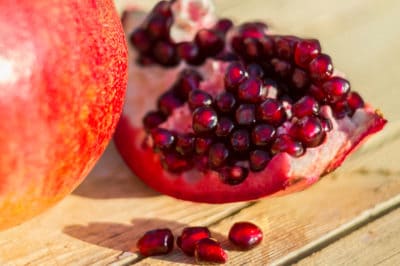Growing Pomegranates
The pomegranate is native to the hot, dry desert climate of Iran and prefers similar growing conditions elsewhere. It will grow in almost any soil as long as it has good drainage. In fertile soils it needs minimal fertilizer, but container plants do need to be fertilized once a month in the growing season. Water regularly for best fruit production, but don’t over-water.
Choosing Varieties
Many pomegranate cultivars are available. The plants grow best in USDA Zones 7 to 10. Storage qualities are similar. Consider these:
- Cloud – sweet, white juice.
- Early Wonderful – blooms late but ripens early.
- Francis – prolific producer, split-resistant fruit.
- Granada – dark red, less tart than some.
- King – very sweet, tendency to split.
- Wonderful – standard commercial variety.
Picking Ripe Pomegranates
Pomegranates must ripen on the tree, so judging ripeness is important. However, the fruit will continue to develop flavor in storage. A ripe pomegranate has a blocky, hexagonal shape with flattened ends. The skin should not have any green and the color should be deep, with a rough, matte finish. Tap the skin with a fingernail and listen for a metallic “tinny” sound. Harvest the whole tree at once.
Storing Whole Pomegranates
Place your pomegranates in cold storage as soon as possible after harvest. Wash the whole fruit in a dilute bleach solution, rinse and dry well – this helps prevent mold. Fruits that are starting to split should be peeled and stored in the refrigerator or by freezing, as splitting increases the risk of molds. Store at 41°F (5°C) to 45°F (7°C). Keep humidity high – 80 to 85 percent.
Freezing Pomegranates
Pomegranate seeds, known as arils, can be stored in the refrigerator for a few days but are best frozen. Peel, seed and rinse the arils. Spread on a metal tray until completely frozen and then quickly repackage in moisture-proof plastic bags. For most recipes, the arils can be defrosted at room temperature or quickly rinsed under cold water before use.
Pomegranate Storage Times
Freshly harvested pomegranates that are intact can be stored at room temperature for two or three weeks, but the quality rapidly deteriorates after that. Refrigerated whole pomegranates may last up to three months in commercial conditions but usually less in the home setting. Frozen arils are usually good for 10 to 12 months.
